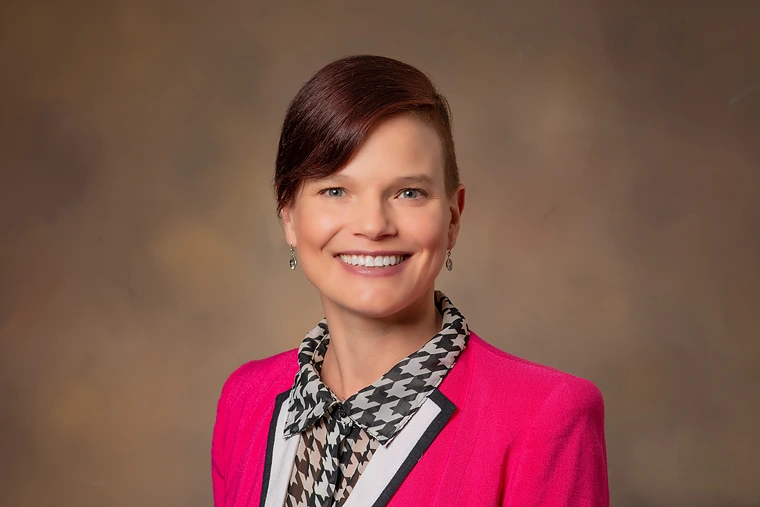Arizona Genetics Core
RRID:SCR_012429
Arizona Genetics Core
Real Time PCR ABI 7900/7300
The following instruments must be scheduled using iLabOperations Software. Please log in or create an account. Instructions on how to reserve time in iLab Operations as well as initiate your usage on the machine are linked below.
Real-Time PCR Cyclers -
ABI-7300 Keating Building - Schedule this instrument
ABI-7900 Keating Building - Schedule this instrument
ABI-7300 Life Sciences South - Schedule this instrument
If you prefer AZGC specialists perform your real-time PCR or qPCR experiment as a service please reach out to discuss your project with our core. Email: azgc@arizona.edu
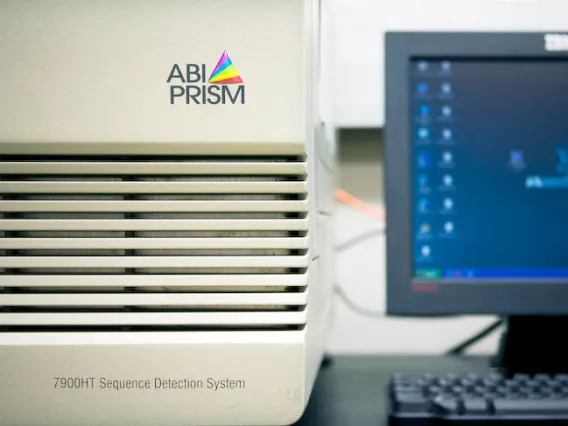
SNP Genotyping - Mass Array
In addition to Real-Time PCR methods, AZGC offers SNP genotyping on the Agena Bioscience MassARRAY® MALDI-TOF instrument. Using this technology we can multiplex SNPs for up to 36 loci.
General Information
Sample Input
Each reaction requires 1µL of 10ng/µL DNA.
The DNA can be submitted in 96-well or 384-well plates with at least 2 open wells for negative controls
Expected Results
Genotypes are determined through ratio analysis of the MALDI-TOF mass spectrometer.
Details
Sample Preparation Details
- The DNA samples should be eluted in RNase free or HPLC water. The instrument is very sensitive to salt, so please avoid TE buffer.
- AZGC can extract and prepare your samples for SNP genotyping.
- The instrument utilizes 384-well plate format.
- The DNA can be submitted in 96-well or 384-well plates with at least 2 open wells per every 384 for negative controls.
- Each reaction requires 1µL of 10ng/µL DNA. It is best if 260/280 ratio is between 1.7 and 2.0.
Workflow
Contact AZGC to discuss SNPs of interest and multiplex design
Multiplex Design Information: This instrument can perform up to a 36-plex, but we typically achieve between 25 and 30 loci. To optimize the largest multiplex possible, it is best to provide 40-50 loci with specific notes about their relative importance. Provide the SNP ID (rs#) and the sequence. Within the sequence, the SNP should be denoted in brackets (i.e. [G/A]), with 100-200 bases of flanking sequence on either side. Tri-allelic SNPs are also detectable. Multiplex PCR assays target ~100bp amplicons containing SNPs of interest.
If there are other known polymorphisms within the sequence please denote them as 'X' so we can design the primers around them. There cannot be polymorphisms bracketing the SNP of interest within 20bp; however, if there is a polymorphism upstream of the SNP of interest, we can design the primer on the antisense strand.
Three primers are utilized per SNP, two for amplification and one for the extension reaction. Primers are unlabeled and usually 15-25 bp in length.
Price
Inquire for quote
Turnaround Time
Varies
Related Services
DNA Extraction
Real Time PCR (alternative SNP genotyping platform)
Additional Information
The price listed above is per 96-well or 384-well plate. If multiplexed at 30 SNPs cost ~ $0.20 per SNP
Primers are not included in the above pricing. These typically run ~$16/SNP.
For more information about the Agena Bioscience MassARRAY® system, please visit our FAQ page or go to http://agenabio.com/
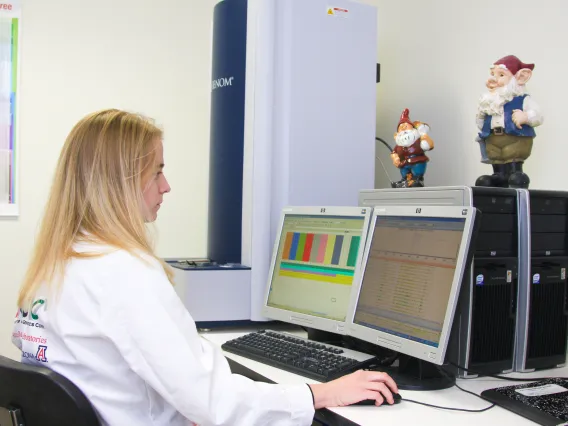
Fragment Analysis
Fragment Analysis
Arizona Genetics Core offers Fragment Analysis services with our two ABI3730 DNA Analyzers. The 3730 uses capillary electrophoresis to separate fluorescently labeled DNA fragments.
General Information
Sample Input
Fluorescently labeled DNA fragments (i.e. labeled PCR Products)
Samples can be submitted in 4-Dye or 5-Dye format, simply upload your sample information in iLab Service Request Form
Expected Results
Data is returned in .fsa file format ready for analysis with Applied Biosystems GeneMapper or compatible software. Applications of fragment analysis include Microsatellite Analysis, Genotyping and Mutation Detection.
Details
Sample Preparation Details
Samples should be submitted in strip tubes or 96-well v-bottom plates in column format and will be run at a dilution specified by the customer- default is 1:50.
Compatible dye sets:
4-Dye: FAM, HEX, NED (internal Size-Standard ROX)
5-Dye: FAM, VIC, NED, PET (internal Size-Standard Liz)
Workflow
Log into iLab operations software and select Request Services
Video Tutorial for Fragment Analysis request
AZGC uses an internal Size Standard - GS500LIZ or GS500ROX and conducts Post Processing and QC steps prior to release of data.
Data is returned to the user's iLab Project as a zipped folder
Price
Academic (UA): $1.75 | Academic (non-UA): $2.10| Industry: $2.63
Unit: Sample
Turnaround Time
2 business days. Please note cut-off time for sample receipt is 2pm. Otherwise, they will be added to the next day's queue.
Related Services
PCR
Additional Information
Reactions may be pooled to facilitate multiplexing.
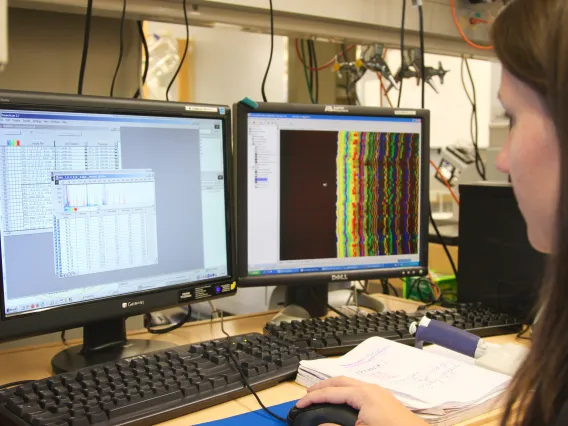
High Throughput DNA Extraction
AZGC's High Throughput DNA Extraction Service uses an automated, robotic system to provide researchers with high quality genomic DNA at a capacity of up to 400 extractions per day.
General Information
Sample Input
AZGC accepts a variety of sample types suitable for this process, including buccal swabs, tissue, cells, or blood.
Expected Results
High-quality genomic DNA, quantified and returned in barcoded plates or tubes.
Details
Sample Preparation Details
This method is most appropriate for projects with 16 samples or more. We prefer to receive samples in barcoded tubes with lysis buffer- contact our lab for tubes or sample preparation guidelines.
Workflow
How to get started with your sample submission:
Log into iLab Operations Software and click Request Services
Video tutorial for iLab submission
*We will review your project request and select an extraction method prior to sample processing
We will extract your sample and can quantify the genomic DNA content by Fluorometric Assay (recommended QC). DNA can be returned to you in barcoded plates or tubes (additional charges may apply), or retained at the AZGC for future testing.
Price
Academic (UA): $9.50 | Academic (non-UA): $11.40| Industry: $14.25 | Unit: Sample
Turnaround Time
5 business days
Related Services
Genotyping - AZGC specializes in sample genotyping. Whether you are interested in STRs, SNPs or sequence data let us help you genotype your samples.
Additional Information
We utilize 2 BioSprint/Kingfisher Extraction Robots and Magnetic Bead Extraction Chemistry. Our high-throughput DNA extraction capacity is 400 samples per day.
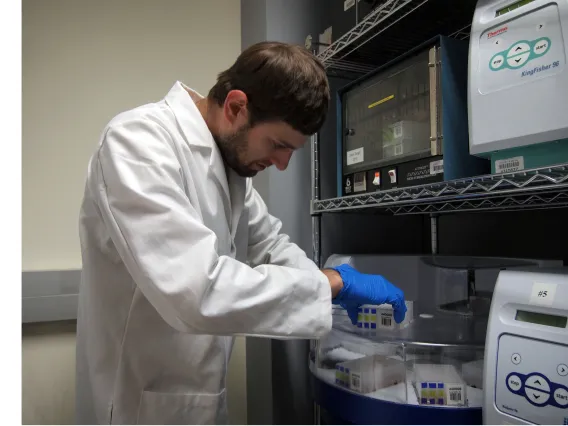
Bioanalyzer
The Agilent Bioanalyzer 2100 offers quick and convenient sizing and quantification analysis for DNA or RNA.
General Information
Sample Input
Agilent High Sensitivity DNA Kit: 11 samples/chip, ≥2µL of each sample prepared in deionized water in .2mL strip-tubes.
Agilent RNA 6000 Pico Kit: 11 samples/chip, ≥2µL of each sample prepared in deionized water in .2mL strip-tubes.
Agilent RNA 6000 Nano Kit: 12 samples/chip, ≥2µL of each sample prepared in deionized water in .2mL strip-tubes.
Expected Results
High Sensitivity DNA Chip: DNA Concentration 5-500pg/µL, DNA sizing 50-7000 bp
RNA 6000 Pico Chip: RNA Concentration Qualitative metrics: RNA Integrity Number (RIN)
Quantitative range = 50-5000pg/µL (Total RNA Assay), 250-5000pg/µL (mRNA Assay)
RNA 6000 Nano Chip: RNA Concentration Qualitative metrics: RNA Integrity Number (RIN)
Quantitative range: 25-500ng/µL (Total RNA Assay), 25-250ng/µL (mRNA Assay)
Details
Sample Preparation Details
AZGC offers analysis with the following chips:
High Sensitivity DNA Chip: For the separation, sizing and quantification of low concentrated dsDNA samples from 50-7000 bp. Your samples should be diluted to 5-500pg/µL, despite what it says on the website. Smaller concentrations may not show up on the chip.
RNA 6000 Pico Chip: Each chip can accommodate 11 samples and uses 2µL of each sample. Prepare your samples in RNase free water. RNA must be submitted in 0.2mL tubes at no greater than 5µL volume. Total RNA in each sample must be between 200-500pg/µL and mRNA concentration must be between 500-5000pg/µL. If your sample is more concentrated please dilute with RNAse free water. This process will render the RNA unusable for downstream applications- please provide only the volume required for this QC.
RNA 6000 Nano Chip: Each chip can accommodate 12 samples and uses 2µL of each sample. Prepare your samples in RNase free water. RNA must be submitted in 0.2mL tubes at no greater than 5µL volume.
Total RNA in each sample must be between 5-500ng/µL and mRNA concentration must be between 25-250ng/µL. If your sample is more concentrated please dilute with RNase free water. This process will render the RNA unusable for downstream applications- please provide only the volume required for this QC.
Learn more information on each chip's specifications
Quantification with the Nanodrop instrument can be very inaccurate. Qubit results are generally much more accurate.
Workflow
If you are submitting RNA, it is recommended that you deliver your samples to the AZGC drop-off freezer inside Keating Rm 106D, please do not submit RNA to the drop-off freezer in LSS.
To submit your samples please log into iLab Operations Software and select Request Services. You should receive results within 2 business days of sample receipt by AZGC.
Price
Academic (UA): $90.00 | Academic (non-UA): $108.00 | Industry: $135.00 Unit:Chip
*Note DNA High Sensitivity Chips are subject to a $25 supplemental reagent fee
Turnaround Time
This workflow takes approximately 1 hour per chip. Turnaround time on Bioanalyzer submissions is within 2 days of samples being physically received by AZGC.
Related Services
Additional Information
The Agilent 2100 Bioanalyzer uses chips that are designed for DNA and RNA analysis. The chips are composed of microchannels that separate the nucleic acid fragments by size as they are electrophoretically moved through the gel matrix.
RNA Chips- This process will render the RNA unusable for downstream applications- please provide only the volume required for this QC.
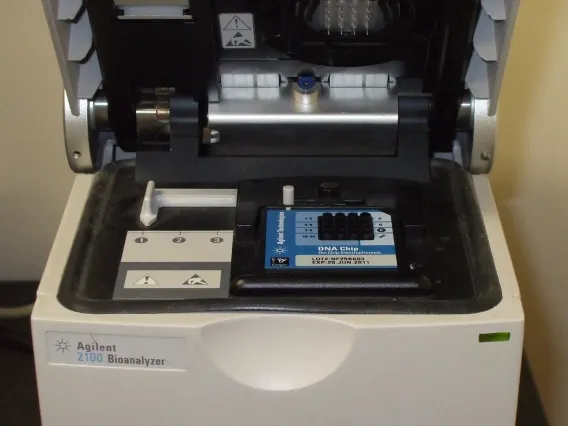
Cell Line Authentication
Cell Line Authentication
Contamination and misidentification of commercial cell lines can jeopardize your research. Cell line authentication can ensure the quality of your work by providing a DNA fingerprint for each of your human cell lines and tissue bank specimens.
General Information
Sample Input
AZGC accepts a variety of sample types, including genomic DNA, cell pellets, or tissue/tumor pieces. Samples requiring DNA Extraction will incur associated extraction charges. Please note - currently we only are able to perform human cell line authentication.
Expected Results
AZGC provides autosomal STR profiles suitable for verification using reference databases (such as ATCC, DSMZ, JCRB and others) or we can internally validate samples unique to your lab. We provide researchers with PDF reports and if requested- sample profiles (allelic values) and electropherogram trace data.
Details
Sample Preparation Details
Genomic DNA should be diluted to 5ng/µL in Low TE or HPLC water. 20µL (100ng) of genomic DNA is sufficient. If you use Nanodrop to quantify your samples please do not dilute your DNA prior to submission.
Cell pellets should contain at least 1x106 cells and are best stored in Lysis Buffer.
Tissue and tumor pieces should be approximately 5mg or the size of a small pea. If you have limited source tissue or expect low sample yield please contact AZGC to discuss the best DNA extraction method.
An electronic submission must be created in iLab Operations Software.
Samples may be shipped to:
AZGC c/o Stacy Sotak
1657 E Helen St Rm. 106
Tucson, AZ 85721
Workflow
Testing details: Promega PowerPlex16HS Assay: 15 Autosomal Loci, X/Y
Random match probability approx. 1 in 1.83x1017
Price
Academic (UA): $65.00 | Academic (non-UA): $78.00 | Industry: $97.50 | Unit: Sample
Turnaround Time
5-7 working days
Related Services
DNA Extraction from cell pellets, tumors, or tissue
Samples are maintained in the lab for 1 month after results are returned to the user, unless other/long-term storage has been requested.
Additional Information
We recommend authentication upon receipt or establishment of a new cell line/specimen, after several passages, and periodically during the life of the research line.
Sample profiles may be compared to other cell lines in this submission or from previous submissions from the same lab group free of additional charge.
Sample profile comparisons to source databases or identification of an unknown genotype or cell line may incur additional analysis charges.
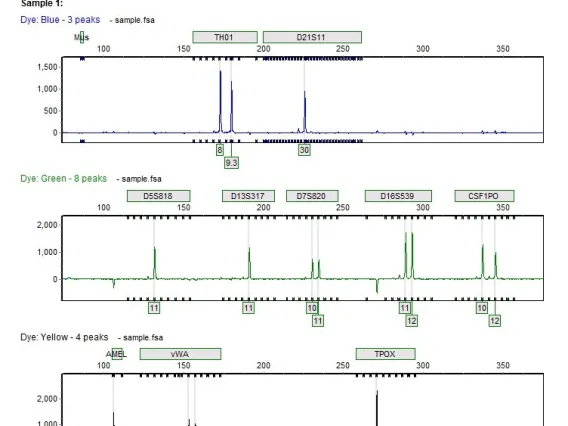
Transgenic Mouse Genotyping
The AZGC provides Transgenic Mouse Genotyping Services. Select your region of interest (see full below), or we can design a custom assay to genotype your specific line. New assays will be subject to a one-time consumable fee. Please contact our core for additional details.
General Information
Sample Input
We provide barcoded collection tubes pre-filled with extraction buffer. Simply add 2-4mm of tail tissue and return to the AZGC. Other tissues can be utilized, please email for details.
Expected Results
Depending on the locus, the AZGC utilizes a variety of methods to generate data on your samples, including fragment analysis and gel electrophoresis.
Note- We can return the remainder of your sample (as crude extract) after genotyping upon request. Samples not returned to researchers will be maintained in our lab for 90 days after genotyping. After 90 days the samples will be destroyed in keeping with our SOPs.
Details
Sample Preparation Details
Sample collection tubes containing extraction buffer are provided. Contact AZGC to request by mail or pick up tubes from the AZGC submission freezer- Keating building 1st floor. Simply add 2-4mm of tail tissue to the tube and return to:
Priscilla Jayassi/ AZGC
1657 E Helen St Rm 106
Tucson, AZ 85721
Samples with STE buffer can be shipped at ambient temperature. Local researchers may drop off samples in person Monday-Friday 9am-5pm. Samples may be dropped off at Keating/BIO5 1st Floor AZGC Submission Freezer- Room 106D.
Other tissues can be utilized, please email for details.
Workflow
How to get started with your sample submission:
• Log into iLab Operations Software and select Request Services.
Price
Academic (UA): $5.00 | Academic (non-UA): $6.00 | Industry: $7.50 | Unit: Assay
Turnaround Time
5-7 business days
Related Services
Quick and Easy DNA Extraction - cost-effective and fast extraction
Additional Information
The price listed above is per assay. Individual samples may be run for multiple assays. Does not include the price for DNA extraction.
Nanostring nCounter Gene Expression Analysis
AZCG offers gene expression services using the NanoString nCounter® Analysis System. This system uses molecular "barcodes" and single-molecule imaging to profile up to 800 mRNAs, microRNAs targets simultaneously with high sensitivity and precision, without any reverse transcription or amplification.
General Information
Sample Input
Gene Expression, miRNA and miRGE Assasys:
• 100ng purified total RNA or 300ng degraded
AZGC offers a variety of extraction services for most sample types, please inquire for details and pricing.
Expected Results
Gene Expression
Limit of Detection:
• 0.5fM spike-in control (~1 copy per cell); 90% of the time
Fold-change Sensitivity:
• >1.5 fold (>5 copies per cell)
• >2 fold change (>1 copy per cell)
miRNA Assay
Limit of Detection:
• ≤ 0.5fM (~10 copies per cell)
Fold-change Sensitivity:
• > 2 fold change
Details
Sample Preparation Details
Varies, please inquire.
Workflow
A variety of pre-designed panels are available for off-the-shelf use. Each cartridge can run up to 12 samples, and most panel kits are sold with chemistry for 12, 24, 48 or 96 samples (Custom Panels start at 48 samples). For a complete list of the number of samples and specific genes covered by each panel, please visit the following links: Nanostring website.
Custom CodeSets
For ultimate flexibility, you can work with NanoString directly (consultation is free of charge) to design a custom Gene Expression or Copy Number Variation code set tailored exactly to your research needs. This is especially useful for organisms that don't already have pre-built panels, hard-to-target sequences, and splice variation and fusion transcript detection. The custom CodeSet design process begins by selecting a list of targets and submitting them to NanoString. Once the design is approved by you, their Manufacturing Group will assemble your CodeSet, perform extensive quality control testing, and ship all components directly to AZGC for processing. Custom CodeSet pricing is matrix based, with the price per data point declining with increasing numbers of genes and numbers of samples assayed.
Price
Academic (UA): $575.00 | Academic(non-UA): $690.00 | Industry: $862.50 | Unit: Cartridge
Note- Cost per Cartridge does not include QC, additional labor or NanoString Code Sets. Reagents must be purchased separately. Please inquire for more details.
Turnaround Time
Depends on assay type and sample quantity, please inquire.
Related Services
Sample Prep and QC
Biomek FX/Biomek NX
Automated Sample handling is performed with our BioMek FX and NX Robots. These liquid handling platforms enable high throughput sample plating, dilution, and other manipulations. AZGC uses these platforms for sample handling in many of our laboratory workflows.
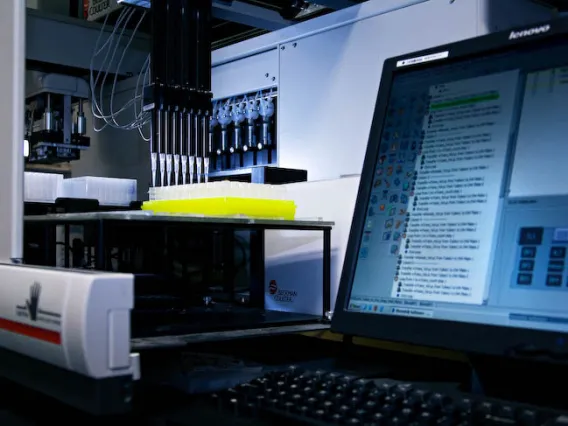
Pagination
- Previous page
- Page 6
- Next page


